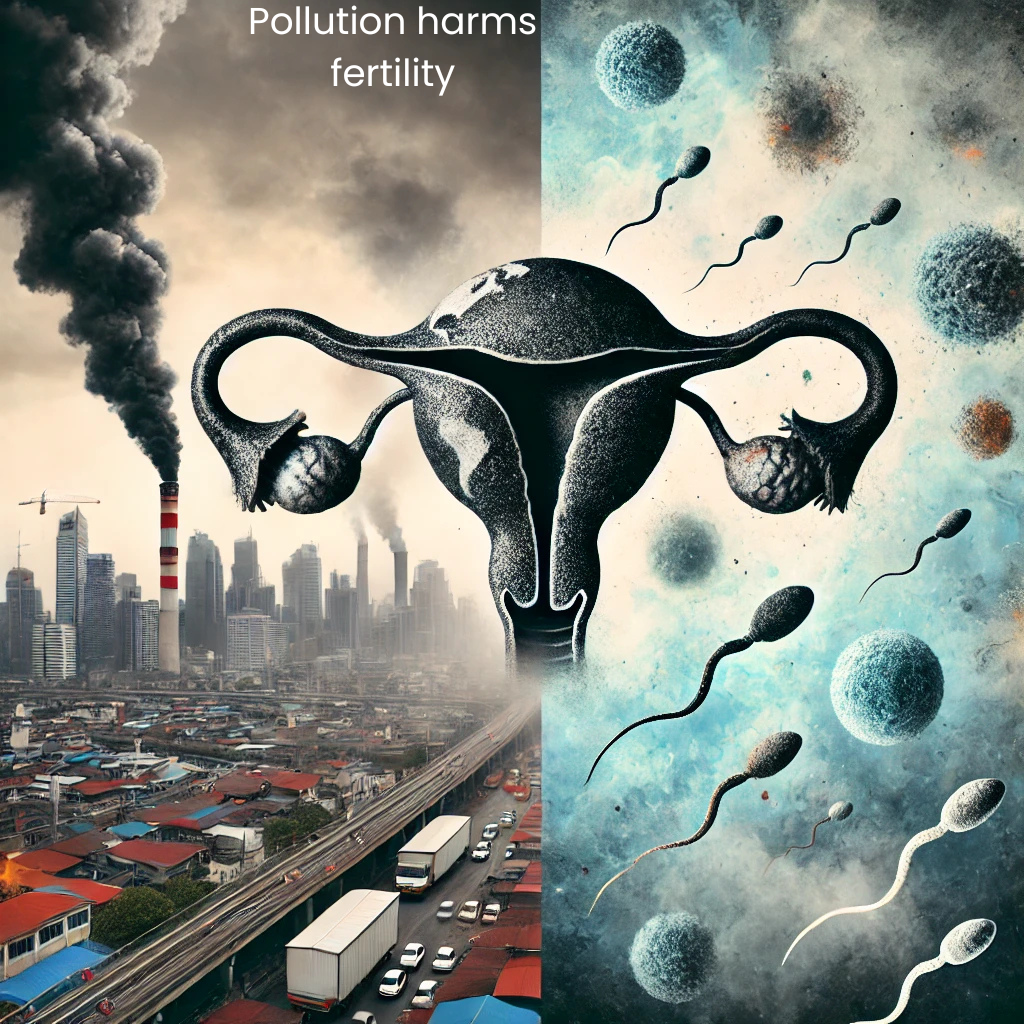Air pollution contains harmful substances like particulate matter (PM), nitrogen oxides (NOx), sulfur dioxide (SO₂), carbon monoxide (CO), and volatile organic compounds (VOCs). Among these, fine particulate matter (PM2.5) is particularly concerning as it can enter the bloodstream, disrupt hormonal balance, impair sperm quality, and affect ovarian function.

For Women
- Hormonal Disruption: Pollutants can interfere with the endocrine system, altering hormone levels crucial for ovulation and pregnancy maintenance.
- Egg Quality: Prolonged exposure to PM2.5 has been linked to diminished egg quality, reducing the chances of conception.
- Increased Risk of Miscarriage: A study in Human Reproduction revealed that women exposed to high PM2.5 levels during pregnancy faced a 20% higher risk of miscarriage.
For Men
- Reduced Sperm Quality: Studies show air pollution can decrease sperm count, motility, and morphology. Research in China reported a 12% reduction in sperm concentration among men in highly polluted areas.
- Oxidative Stress: Pollutants induce oxidative stress in the testicular environment, damaging sperm DNA and contributing to infertility.
Shocking Statistics on Air Pollution and Fertility
- Global Impact: According to the World Health Organization (WHO), over 90% of the global population breathes air with dangerously high pollution levels.
- Male Fertility Decline: A 2019 meta-analysis highlighted a global sperm count decline of more than 50% over the past four decades, with air pollution as a contributing factor.
- Female Fertility Challenges: Women in highly polluted regions take 20–25% longer to conceive compared to those in areas with cleaner air.
How Air Pollution Affects Reproductive Organs
Ovaries and Uterus
Chronic exposure to air pollutants can cause ovarian inflammation, affecting follicle development and egg maturation. It can also reduce the uterine lining’s receptivity to embryo implantation.
Testes
Pollutants like PM2.5 and heavy metals disturb the testicular microenvironment, reducing sperm production and increasing the risk of genetic abnormalities in sperm cells.
Embryo Development
Airborne toxins can cross the placental barrier, potentially causing low birth weight, preterm birth, or developmental delays in the fetus.
Protecting Your Fertility in Polluted Environments
Although eliminating exposure to air pollution entirely may be impractical, you can take steps to minimize its impact:
- Invest in Air Purifiers: Use high-efficiency air purifiers at home to reduce indoor air pollution.
- Monitor Air Quality: Apps and websites like AirNow or IQAir provide real-time air quality updates, helping you avoid outdoor activities during high-pollution periods.
- Adopt a Healthy Diet: Include antioxidant-rich foods like fruits, vegetables, and nuts in your diet to combat oxidative stress.
- Avoid Smoking: Smoking exacerbates the effects of air pollution on fertility.
- Wear Masks: Use masks designed to filter PM2.5 particles in highly polluted areas to reduce exposure.
The Role of Policy and Awareness
Addressing air pollution’s impact on fertility requires collective action. Governments must implement stricter air quality regulations and encourage sustainable practices. Public awareness campaigns can educate individuals about the importance of air quality for overall health, including reproductive health.
Conclusion
The effects of air pollution on fertility are a growing concern, disrupting hormonal balance, impairing sperm quality, and affecting egg health. By staying informed and taking proactive measures, you can protect your reproductive health despite the challenges of living in a polluted environment. Gracious IVF is committed to supporting individuals and couples in overcoming these challenges and achieving their dreams of parenthood.
Frequently Asked Questions (FAQs)
- Can air pollution really affect fertility?
Yes, air pollution can disrupt hormonal balance, reduce sperm quality, and impair ovarian function, making conception more difficult.
- Is indoor air pollution as harmful as outdoor air pollution?
Yes, indoor air pollution from sources like cooking fumes and household chemicals can negatively affect fertility. Using air purifiers can help. - Can wearing masks protect against the fertility effects of air pollution?
Masks reduce PM2.5 particle inhalation but are not a complete solution. Minimizing exposure to air pollution is essential.
- Are certain pollutants more harmful to fertility?
Particulate matter (PM2.5), nitrogen oxides, and heavy metals like lead are particularly detrimental to reproductive health.
- How can I improve my fertility in a polluted environment?
Adopt a healthy lifestyle with a balanced diet, regular exercise, and measures to minimize pollution exposure.
Gracious IVF is here to guide you on your journey to parenthood amidst these environmental challenges.

